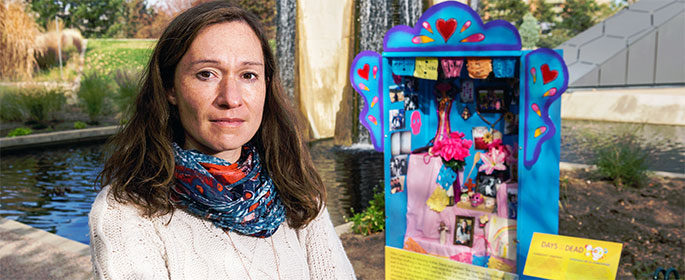Honoring a Patient

By Lilia Cervantes, MD
(May 2017) I am a Latina physician who had been a full-time clinician until 2014 when I began pursuing a research career. I am driven by a passion to change local and national policy to improve access to care for undocumented immigrants with end-stage renal disease (ESRD).
As a physician at Denver Health, I became closely acquainted with an undocumented Mexican patient who had ESRD with severe symptoms. In Colorado, undocumented patients can only receive dialysis when they arrive critically ill in the emergency department.
My patient was homeless. She had two boys in elementary school. She had previously suffered three cardiac arrests.
Her goal was to be comfortable. She asked to withdraw from dialysis, to have a natural death.
I gathered a multi-disciplinary team. Together, we found her a temporary home while we worked with an adoption agency to find a family that adopted her children. We then sought assistance from the Mexican consulate, securing her a passport to return home to Mexico. She wanted to pass away in her father’s home.
 My patient’s story has inspired me to help others like her and her experience continues to ground my research vision.
My patient’s story has inspired me to help others like her and her experience continues to ground my research vision.
Soon after she passed away, and while I was working as a full-time clinical hospitalist, I wrote a research proposal to improve palliative care in Latinos with ESRD. I was awarded a four-year Harold Amos Medical Faculty Development stipend from the Robert Wood Johnson Foundation.
My transition from full-time clinician to a practicing physician with a research portfolio has been both challenging and exciting.
My childhood shaped how I respond to challenges. I grew up in the Valverde neighborhood on Denver’s west side and I faced food insecurity, homelessness, and learned English as a second language.
With each challenge we faced as a family, my parents taught me to be tenacious, to use education to empower myself to change the well-being of my community and to believe that the impossible is possible.
Many thought it would be impossible for me to switch from a clinical to a research track after working as a full-time hospitalist for six years. It has now been two years since I received the Harold Amos Medical Faculty Development award. I am determined to succeed and become an independent researcher.
My research to shape public policy and change access to care for undocumented immigrants with ESRD has informed others of the experiences of patients whom they might have not noticed previously.
These studies have included qualitative interviews of patients describing their illness experiences, which was published earlier this year in JAMA Internal Medicine; a retrospective analysis looking at mortality differences between emergency-only and routine thrice weekly hemodialysis among undocumented immigrants, which is currently in review for publication; and qualitative interviews of healthcare professionals who provide care for undocumented immigrants with ESRD to describe their perspectives, which is currently a work in progress.
My patient passed away three years ago now. I have remained in touch with her boys and the people who surrounded her during her last weeks in Colorado.
This past year, we all came together for Day of the Dead at the Denver Botanic Gardens to celebrate her life by creating an altar in her honor. We all reflected on how her life had inspired and changed us for the better.
Lilia Cervantes, MD, is an associate professor of medicine and a hospitalist at Denver Health and Hospital Authority.